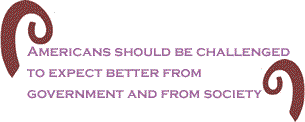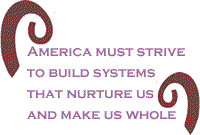|
A
very thought-provoking poll was released recently on Americans
and their attitudes toward Christianity and capitalism.
The survey
found that more Americans believe that Christianity and
the free market are in conflict (44 percent) than those
who think they are not (36 percent).  This
holds regardless of religious affiliation. Women, Democrats
and those of low income are more likely to believe the two
are incompatible. Meanwhile, Tea Party members, Republicans,
college-educated and more affluent people were more likely
to believe the two are not at odds. This
holds regardless of religious affiliation. Women, Democrats
and those of low income are more likely to believe the two
are incompatible. Meanwhile, Tea Party members, Republicans,
college-educated and more affluent people were more likely
to believe the two are not at odds.
White
evangelicals are more likely than the general population
to believe unregulated businesses would behave ethically.
Meanwhile, Christians of color overwhelmingly (76 percent)
want the church to speak out on social justice matters,
and economic issues such as foreclosures devastating the
community.
So
what should we make of this? At first glance, it tells me
that there is hope. Today�s economic troubles are opening
the eyes of Americans, perhaps. The inequality in this nation
- and the flagrant manner in which concentrated power flaunts
its excesses � is so perverse that it offends the moral
sensibilities and belief systems of everyday folks. If there
is any chance of reforming or changing our institutions,
it all begins with asking if we expect - or demand - moral
and ethical institutions that bend towards justice. Like
the flailing, bankrupt Communist system in the final days
of the USSR, American capitalism has revealed itself
as a sham religion that promises much and operates under
deceptive rhetoric, yet ultimately benefits a scant few.
Right now, the system seems to be thriving perversely on
the economic inequality that is eating society alive. Wall
Street profits and executive bonuses are up, rewards for
their plunder of the rest of us.
And
yet, isn�t this the way it was supposed to be? Did capitalism
ever have a moral compass? And haven�t capitalism and Christianity
always operated in tandem for centuries?
Slavery
has to be the ultimate example of unfettered, unregulated
markets, laissez faire in its purest sense. The Church blessed
slave ships and expeditions to rape and pillage indigenous
peoples, and one slave ship was even named Jesus. Earlier
forms of the Christian Right endorsed the economic exploitation
of slavery and Jim Crow segregation and found justification
in the Bible. Even today, some so-called Christians give
their stamp of approval on cuts in crucial government programs
that serve poor families, or the despoliation of the land
by oil companies in the name of economic growth.  They
even compare the hand of the free market to the hand of
God. After all, gun manufacturers have to make a buck, too,
the way Jesus wanted it. They
even compare the hand of the free market to the hand of
God. After all, gun manufacturers have to make a buck, too,
the way Jesus wanted it.
So,
is capitalism at odds with Christianity? I suppose it all
depends on which Christianity you use as your point of reference.
The Christianity of the rightwing is the imperial, status
quo Christianity that helps prop up the rich and the powerful.
Then there�s the other side of the coin - the Christianity
that believes in social justice, liberation theology and
caring for the least of these. This is the Christianity
that believes it is easier for the camel to pass through
an eye of a needle than it is for the wealthy to enter the
kingdom of God. It was Jesus who drove the
money-changers, the Wall Street bankers of the day, out
of the temple. Adherents to this school fought for the abolition
of slavery and struggled for racial and economic equality
in the civil rights movement. Like Martin Luther King, Jr.,
they fought for sanitation workers.
The
early twenty-first century is not the first time capitalism
has run roughshod over the people�s rights, nor, sadly,
will it likely be the last. The problem is that the counterbalance
to capitalism - call it a social safety net, social welfare,
the New Deal, socialism or what have you - has eroded in
the U.S. And while good
people of faith (or no faith at all) struggle to restore
it, other so-called people of faith welcome its demise,
if they do not manipulate their religion to justify that
demise. Sadly, that is as much a condemnation of religion
and the way it is practiced as it is an indictment of capitalism.

It
is easy for Americans to point to the oppression in certain
Muslim nations and shake their heads in disbelief. It is
quite another thing to look inward at the injustice, the
poverty, the hunger and the unemployment that is tolerated
in a nation where so many would preach to others about Jesus
Christ. Regardless of faith, Americans should be challenged
to expect better from government and from society. Many
followers of the cult of capitalism drank the kool-aid,
believing in the virtues of chasing a dollar above all else.
They were convinced, as some still are convinced despite
the lack of evidence, that by redistributing the nation�s
money in an upward direction, it would trickle down. And
why would you want to tax the rich when capitalism has convinced
you that you will become rich someday? Of course,
for most of us that won�t happen in the land of opportunity,
which is the least economically mobile society in the developed
world.  Moreover,
the Tea Party-infused GOP has convinced its followers to
vote against their own interests. The diehard followers
of the rightwing oppose health care and social programs
that ameliorate the effects of capitalism on the grounds
that blacks and Latinos will benefit the most. Moreover,
the Tea Party-infused GOP has convinced its followers to
vote against their own interests. The diehard followers
of the rightwing oppose health care and social programs
that ameliorate the effects of capitalism on the grounds
that blacks and Latinos will benefit the most.
Rather
than blindly place our faith in institutions that are paving
the way for our downfall - yet we dare not touch them because
we deem them sacrosanct - America must strive to build
systems that nurture us and make us whole. We can create
whatever we want. The propped-up, broken structures need
to be fixed or replaced. Capitalism as practiced in the
U.S. - under-regulated, unaccountable and based
on winners and losers and short-term gain - is a system
of privatized profits and socialized risk. And it is killing
us. But should an economic system be moral? I certainly
hope so.
BlackCommentator.com Executive Editor, David
A. Love, JD is a journalist and human rights advocate based
in Philadelphia, is a graduate of Harvard College and the University of Pennsylvania
Law School. and a contributor to The Huffington
Post, the Grio, The Progressive
Media Project, McClatchy-Tribune News Service,
In These
Times and Philadelphia
Independent Media Center. He also blogs at davidalove.com, NewsOne, Daily Kos, and Open Salon. Click here to contact Mr. Love.

|

